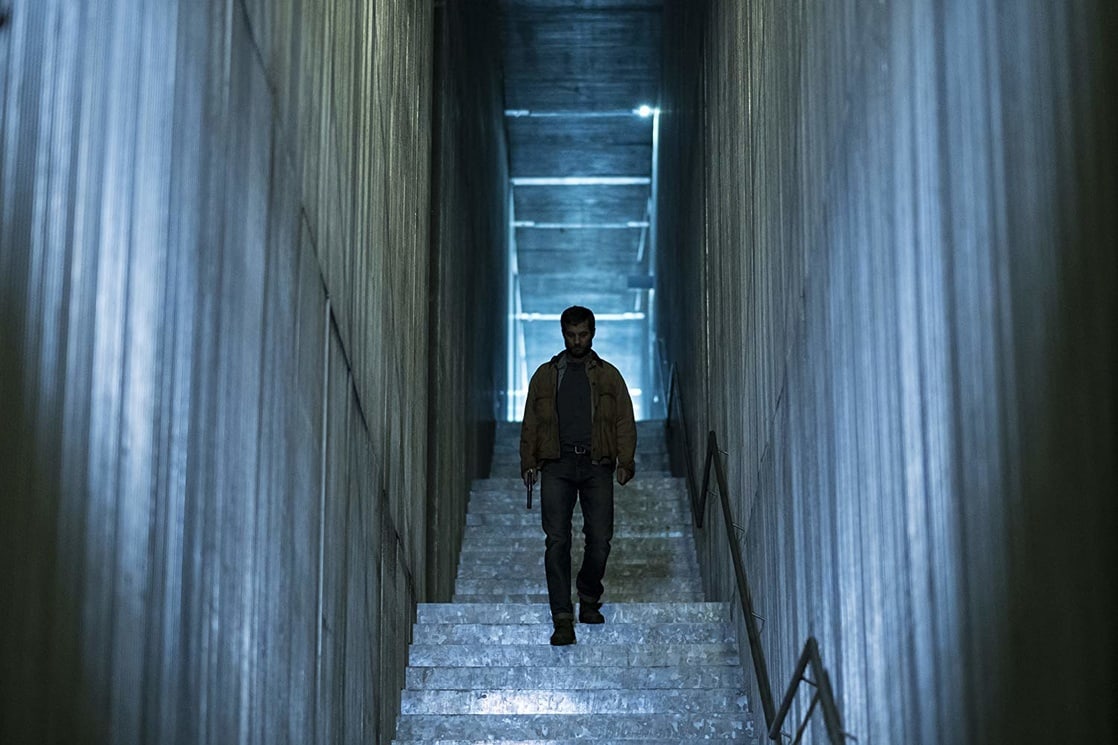REVIEW: Upgrade (2018)
Runtime: 100 Mins
Rated: R
What To Expect: A violent, inventive, badass sci-fi action thriller
Ostensibly emerging out of nowhere, 2018’s Upgrade is one of the biggest film-going surprises of the year; an old-school, dark, noir-ish sci-fi action-thriller reminiscent of The Terminator and RoboCop. Upgrade was written and directed by Australian filmmaker Leigh Whannell, who knows a thing or two about genre pieces after scripting both Saw and Insidious, among other titles. Flying solo without frequent collaborator James Wan as a producer, Whannell acquits himself admirably here, elevating what is essentially a B-movie into A-grade territory. More or less an Australian movie with Blumhouse backing, this is precisely the type of inventive, smart, brutally violent, darkly humorous and high-concept picture that John Carpenter would have created in the 1980s – in fact, it feels like a movie you would discover on a well-worn VHS cassette hiding at the back of a video rental store back in the day. (If somebody spearheads a VHS release, I want it.)
Set in an unspecified near-future, Grey (Logan Marshall-Green) is a stay-at-home mechanic who fixes classic cars to sell to rich collectors, and prefers a more hands-on, old-school lifestyle in the face of advanced, ubiquitous technology. After visiting eccentric, tech-savvy client Eron (Harrison Gilbertson) one night, Grey and his wife Asha (Melanie Vallejo) are ambushed and attacked by a group of cybernetically-enhanced criminals, which leaves Asha dead and Grey paralysed from the neck down. Faced with a life relying on computers and technology, with no ability to use his hands, Grey falls into a heavy depression. However, Eron presents him with the opportunity to gain back full use of his body via an illegal experimental operation to attach an artificial implant known as STEM (voiced by Simon Maiden) to his spine. Cured of his paralysis but sworn to secrecy, Grey begins his own investigation into the men responsible for his condition, using his AI-augmented body to kill them one by one.
For the majority of its runtime, Upgrade plays out like a high-concept Death Wish reimagining, but Whannell has a few tricks up his sleeve. Twists and turns emerge out of the chaos, leading to a daring, jaw-dropping climax which recontextualises the narrative, catapulting Upgrade above the ordinary. Admittedly, the narrative ingredients are standard-order, including a police detective (Betty Gabriel) who suspects that Grey knows more about the sudden murders than he lets on, but that’s ostensibly the point; Upgrade is a postmodern subversion of the hackneyed revenge fantasy formula, permeated with a relevant message relating to the dangers of automation. In addition, the meticulous world-building further bolsters the material, with Whannell painting a plausible picture of our future. The world of Upgrade is undeniably our own, but peppered with unobtrusive instances of speculative future technology. Lower socioeconomic areas exist in this vision of the future, while characters still use simpler items like tape recorders. Rather than feeling artificial or deliberately designed, this world feels lived-in and believable, and all on a tiny budget.
Produced in Australia for a reported cost of under $5 million, Upgrade’s technical specs are far better than expected, shrewdly using every last cent out of the budget to create a flick that looks at least four or five times more expensive. This is only Whannell’s second directorial outing, but he displays the confidence of a seasoned veteran. Who would have thought that the director of 2015’s paint-by-numbers Insidious: Chapter 3 would be capable of such a pronounced sense of cinematic style and personality? No matter the scene or environment, Whannell maintains a confident pace and his mise-en-scène is frequently smooth, while discreet digital effects serve to enhance the practical sets. Additionally, Marshall-Green nails the role of Grey, perfectly portraying the script’s intense dramatics as well as handling the intricate physicality the part requires. STEM’s movements look subtly mechanical, from the smallest hand gestures to the precise fight choreography, easily selling the illusion with seemingly little effort. He even convincingly pulls off the scenes during which he talks to STEM, moments that were at risk of looking ridiculous. An adept supporting cast surrounds Marshall-Green, with Maiden making a particularly positive impression as the voice of STEM. Elsewhere, the likes of Gilbertson (Need for Speed), Gabriel (Get Out) and Benedict Hardie (Hacksaw Ridge) hit their marks effectively. Even Clayton Jacobson (director of Kenny) shows up in a minor role.

Upgrade packs a punch during its visceral action beats, miraculously able to create a fresh look through specific fight choreography and inventive camera techniques, evoking the type of sheer elation that the first John Wick inspired back in 2014. This flick is a hard R, exhibiting a level of violence usually reserved for “torture porn” movies, but there is also wise tact to the gory money shots, which is a testament to Whannell’s well-judged direction. Furthermore, Stefan Duscio’s digital cinematography is slick and assured, astutely using neon lighting to emphasise the retro vibe, making Upgrade look closer to a European art-house flick helmed by Nicolas Winding Refn. (It is a bit of a shame that Upgrade was not shot on film stock considering the pedigree, but that’s neither here nor there.) Accompanying the visuals is a throwback synth score by Jed Palmer which adds mood and atmosphere, in addition to subtly accentuating the feeling of excitement during the adrenaline-pumping action sequences. A few short moments of obvious CGI blood do appear, but the special effects throughout the feature otherwise impress, particularly the convincing futuristic cityscapes. It’s mind-blowing to consider that Upgrade was created for less money than so many nasty, straight-to-video cheapies that flood the bargain bin on a seemingly weekly basis.
Upgrade is superlative masculine entertainment, a throwback action-thriller which exceeds all reasonable expectations to become one of 2018’s best and most essential movies. Aside from the palpable Death Wish influence, the feature is essentially Alex Garland (think Ex Machina) meets Nicolas Winding Refn with a hint of Black Mirror, and it will appeal to those who enjoy ’80s and ’90s genre pictures. In the face of so many expensive summer blockbuster spectacles, it’s refreshing to witness this type of counterprogramming that’s committed to delivering more with less. It’s just a nasty good time. If Upgrade was directed by, and starred a black man in the lead role, it would be receiving accolades and Oscar talks like the studiously mediocre Get Out.















10 Comments